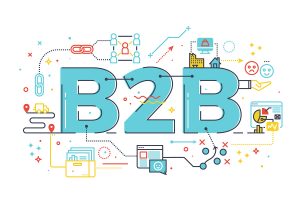B2B sales
B2B sales are becoming the focus of many businessmen who work with large companies or are intermediaries in any industry. Such sales have their own characteristics and nuances, which must be taken into account when forming the entire commercial policy of the organization.

B2B sales what is it
Sales between legal entities (between companies, firms and organizations) are commonly called B2B.
B2B stands for “business to business”, i.e. selling “a business for another business”. They differ significantly from the sale of products to ordinary consumers, since the motives and goals for buying from legal entities are different than from consumers in a shopping center, for example.
Examples and features of b2b sales and services
Any company that sells something on the market has not only its customers, but also several counterparties – intermediaries who supply materials that the company subsequently modifies or produces some of them for further resale. The supply of goods or materials from intermediaries for resale is B2B sales.
The features of the B2B sphere include the following:
- the number of market players (buyers and sellers) is relatively small. There are much more of them on the consumer goods market, and therefore the competition in the B2B area is not so strong;
- when making purchases, companies are guided by rational motives, not emotional ones, as is often the case in the B2C market – that is, the market “company – consumer, individual”. It is unlikely that companies that buy semi-finished products for their processing and subsequent sale will make impulse purchases. Such organizations usually study suppliers for a long time and choose those who are ready to provide not only a high-quality and affordable product, but also offer special conditions for cooperation – discounts for large orders, a more efficient delivery system, and much more;
- Buying companies are well aware of the product they are purchasing, as they are constantly monitoring the market and its latest trends. In addition, being engaged in the production of the final product from the materials provided by the supplier, the company knows all the details regarding the quality of the materials entering the production;
- B2B pricing policy is formed in a special way – strategic and mutually beneficial partnerships are important here. Therefore, for different customers, a different price of a product or material can be formed;
batches that customers order differ in volume and quantity of goods. These are always wholesale deliveries;
demand for goods is not elastic and is always influenced by external economic factors. The general economic situation in the country or regions can affect demand to a greater extent than the desire of the buyers themselves; - the most effective way to promote products in the B2B sphere is direct sales – negotiations with representatives of companies, which, with a competent approach, often lead to the conclusion of mutually beneficial deals;
relationships between partners in this area of sales are always built on trust and stability of supply. Unlike consumer products, in the B2B market, it is not so much the value or brand of a company that plays a big role, but its reputation and proven business connections.
An excellent example of a B2B business is the construction industry, plants and factories that produce products for end consumers, and the automotive industry.

The simplest example would be a furniture factory that operates both in the B2B market and in the B2C market. The purchase of materials from which tables, chairs, sofas, and other furniture are then made is B2B. And wood processing plants in this case are B2B sellers. But when the furniture has already been produced, and it is delivered to furniture stores for sale to individuals, this is already a B2C market.
Direct sales b2b
The B2B market is dominated by direct sales. This is a direct communication between the seller and the buyer, the purpose of which is to conclude a transaction.
There are several advantages of direct sales in this area:
- when talking with a client, you can see his reaction, understand the motives, “talk” him and find out the conditions under which he agrees or does not agree to buy the goods;
- significant savings on advertising, tk. direct sales is just a waste of time resources of managers;
point hit – the uniqueness of direct sales is that they are aimed at a specific person and his further “processing” to conclude an agreement.
The disadvantages can only be called the likelihood of incompetent communication of the sales manager, therefore, many companies develop training systems for employees of the commercial department so that they can know the basic methods of working with customer objections and be able to identify their true needs.
What does active sales mean in the b2b segment
Active sales are direct communication with the client, during which the following occurs:
- collection of all necessary information about the client;
- direct contact;
- identification of needs
- news;
- product presentation, work with objections;
- conclusion of a contract, purchase of goods.
Another important point in active sales is the analysis of failed transactions, the study of the actions of the sales manager, the search for errors and their elimination.
Effective sales, objections, conversion, marketing
The effectiveness of sales depends on how managers are able to predict the words and actions of the client, how much they understand the product and how they can motivate the buyer to sign the contract.
Therefore, many companies, either on their own or through third-party organizations, conduct trainings aimed at:
- to work with objections;
- to increase conversion (that is, the transformation of a potential client into a real one);
- to develop general marketing skills – analysis of needs, study of competitors and consumers.
Increase wholesale b2b sales with showcase demos
Despite the widespread use of high-tech communications, the exhibition still remains one of the effective ways to increase wholesale sales in the b2b sector.
Due to the exhibition exposition, you can:
- showcase a product or service;
- answer questions and, most importantly, refute objections;
- build relationships with new business partners;
- to show the latest achievements to those companies with which the organization has been working for a long time.
